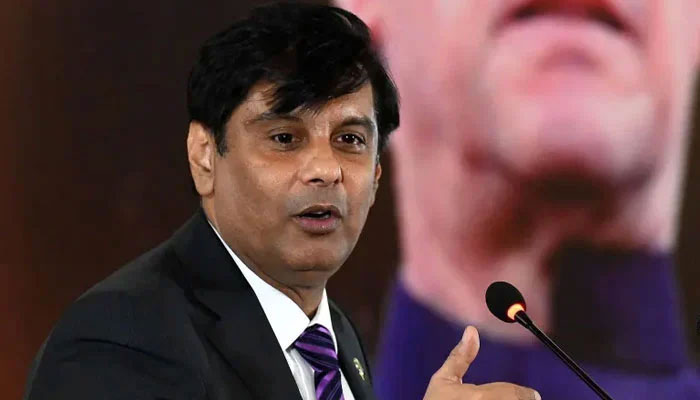Arshad Sharif murder case referred to committee for larger bench
Justice Mansoor observed that this three-member bench could not hear arguments on merits of case
ISLAMABAD: The Supreme Court on Monday referred a suo motu case regarding slain journalist Arshad Sharif, who had been assassinated in Kenya, to a three-member committee for constituting a larger bench.
A three-member bench of the apex court headed by Justice Syed Mansoor Ali Shah and comprising Justice Naeem Akhtar Afghan and Justice Shahid Bilal Hassan heard the suo motu case regarding independent and transparent investigation into the murder of Arshad Sharif.
During the hearing, Justice Mansoor Ali Shah observed that the case was earlier heard by a five-member bench, adding that it seemed the matter had been fixed before this bench by a mistake.
He said that this matter also did not come before a three-member committee, constituted under the Supreme Court (Practice and Procedure) Act 2023, that decide about the constitution of a bench for hearing a suo motu case.
Attorney General Mansoor Usman told the court that a draft for Mutual Legal Assistance (MLA) has been prepared and soon it will be approved by the cabinet in its upcoming meeting. To a question, the AG informed the court that the Kenyan court has also announced its decision in the matter in hand.
Justice Mansoor observed that this three-member bench could not hear the arguments on the merits of the case.
Advocate Shaukat Siddiqui, representing the family members of the slain journalist, informed the court that earlier they had submitted an application before the larger bench and had requested for summoning those people who claim that they have the knowledge as to who killed Arshad Sharif.
Siddiqui further submitted that they had also placed in the application names of those six persons who knew who were involved in killing of Arshad Sharif. He submitted that the larger bench had dismissed the application for not being maintainable.
Justice Mansoor observed that the matter was very important and should be heard at length but added that as the matter has been heard earlier by a five-member larger bench, therefore, it would be appropriate that it should be referred to the committee for fixing the larger bench to hear the case.
It is pertinent to mention here that former Chief Justice Umer Ata Bandial had taken suo motu notice of murder of journalist Arshad Sharif and later on a five-member bench of the apex court headed by him had heard the case.
-
 5 Celebrities You Didn't Know Have Experienced Depression
5 Celebrities You Didn't Know Have Experienced Depression -
 Trump Considers Scaling Back Trade Levies On Steel, Aluminium In Response To Rising Costs
Trump Considers Scaling Back Trade Levies On Steel, Aluminium In Response To Rising Costs -
 Claude AI Shutdown Simulation Sparks Fresh AI Safety Concerns
Claude AI Shutdown Simulation Sparks Fresh AI Safety Concerns -
 King Charles Vows Not To Let Andrew Scandal Overshadow His Special Project
King Charles Vows Not To Let Andrew Scandal Overshadow His Special Project -
 Spotify Says Its Best Engineers No Longer Write Code As AI Takes Over
Spotify Says Its Best Engineers No Longer Write Code As AI Takes Over -
 Michelle Yeoh Addresses 'Wicked For Good' Snub At 2026 Oscars
Michelle Yeoh Addresses 'Wicked For Good' Snub At 2026 Oscars -
 Trump Revokes Legal Basis For US Climate Regulation, Curb Vehicle Emission Standards
Trump Revokes Legal Basis For US Climate Regulation, Curb Vehicle Emission Standards -
 DOJ Blocks Trump Administration From Cutting $600M In Public Health Funds
DOJ Blocks Trump Administration From Cutting $600M In Public Health Funds -
 2026 Winter Olympics Men Figure Skating: Malinin Eyes Quadruple Axel, After Banned Backflip
2026 Winter Olympics Men Figure Skating: Malinin Eyes Quadruple Axel, After Banned Backflip -
 Meghan Markle Rallies Behind Brooklyn Beckham Amid Explosive Family Drama
Meghan Markle Rallies Behind Brooklyn Beckham Amid Explosive Family Drama -
 Scientists Find Strange Solar System That Breaks Planet Formation Rules
Scientists Find Strange Solar System That Breaks Planet Formation Rules -
 Backstreet Boys Voice Desire To Headline 2027's Super Bowl Halftime Show
Backstreet Boys Voice Desire To Headline 2027's Super Bowl Halftime Show -
 OpenAI Accuses China’s DeepSeek Of Replicating US Models To Train Its AI
OpenAI Accuses China’s DeepSeek Of Replicating US Models To Train Its AI -
 Woman Calls Press ‘vultures’ Outside Nancy Guthrie’s Home After Tense Standoff
Woman Calls Press ‘vultures’ Outside Nancy Guthrie’s Home After Tense Standoff -
 Allison Holker Gets Engaged To Adam Edmunds After Two Years Of Dating
Allison Holker Gets Engaged To Adam Edmunds After Two Years Of Dating -
 Prince William Prioritises Monarchy’s Future Over Family Ties In Andrew Crisis
Prince William Prioritises Monarchy’s Future Over Family Ties In Andrew Crisis




